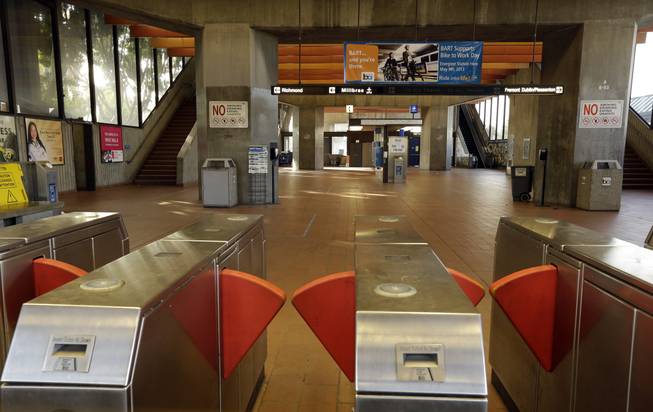
Ben Margot / AP
The Fruitvale BART station is closed due to a worker strike Monday, July 1, 2013, in Oakland, Calif. Negotiations between the two largest unions representing more than 2,300 Bay Area Rapid Transit workers and BART management broke off late Sunday despite the request of California Gov. Jerry Brown in a last-ditch effort to reach a deal.
Monday, July 1, 2013 | 10:22 a.m.
OAKLAND, Calif. — Faced with a transit strike, San Francisco Bay area commuters got out the door earlier than usual Monday and encountered crowded roads and lines for buses and ferries after Bay Area Rapid Transit train workers went on strike.
However, rush hour did not come to a standstill as feared, and some travelers who used carpool lanes and other options added relatively little time to their commutes.
Two of BART's largest unions went on strike after their contract expired the previous night, halting train service for the first time in 16 years.
The walkout promised to derail more than 400,000 riders who use the nation's fifth-largest rail system and affect every mode of transportation. Transportation officials said another 60,000 vehicles could be on the road, clogging highways and bridges throughout the region.
Traffic at a toll plaza of the San Francisco-Oakland Bay Bridge was heavier than usual early Monday. People also lined up to take buses that were leaving from a few Bay Area Rapid Transit stations.
Alameda-Contra Costa Transit buses into San Francisco carried more passengers, with some waiting for more than a half-hour to board, riders and bus drivers said.
"It's pretty crazy," said Young Choi, 34. "It's creating a pretty chaotic feeling in terms of the commute situation."
Choi, an architect in San Francisco's financial district, got dropped off by a friend in Berkeley from Walnut Creek around 6:30 a.m. so he could catch a bus after hearing about the strike.
He normally left for work later but was navigating a new route so he wanted to get an early start.
Alejandro Illidj, 20, woke up two hours earlier than usual to get to his job at Nordstrom in San Francisco, but he had to wait for a bus with room to accommodate him.
"More power to the unions, but at the end of the day, how are we supposed to get to work?" said Illidj, a University of California, Berkeley student. "How is the economy supposed to work?"
The strike was called after an 11th-hour effort failed to produce a new contract by the deadline of midnight Sunday. Both the unions and management said they were far apart on key sticking points including salary, pensions, health care and safety. BART workers picketed outside stations Monday.
"A strike is always the last resort and we have done everything in our power to avoid it," said Josie Mooney, a negotiator for Service Employees International Union Local 1021.
"Our members aren't interested in disrupting the Bay Area, but management has put us in a position where we have no choice," said Antonette Bryant, president of Amalgamated Transit Union Local 1555.
Negotiations fell apart Saturday and the unions walked away from the table. California Gov. Jerry Brown's office had urged both sides to resume discussions Sunday with rush hour on the horizon.
But talks between the two sides came to an end Sunday night with BART accusing negotiators of walking away from the bargaining table, while the SEIU countered in a statement that management "threw in the towel."
The unions, which represent nearly 2,400 train operators, station agents, mechanics, maintenance workers and professional staff, want a 5 percent raise each year over the next three years. BART said train operators and station agents in the unions average about $71,000 in base salary and $11,000 in overtime annually. The workers also pay a flat $92 monthly fee for health insurance.
BART spokesman Rick Rice said the agency had upped its original offer of a 4 percent pay increase over the next four years to 8 percent. The proposed salary increase is on top of a 1 percent raise employees were scheduled to receive Monday, Rice added.
The transit agency also said it offered to reduce the contribution employees would have to make to pensions, and lower the cost for health care premiums.
BART's last strike lasted six days in 1997. The transit agency handles more than 40 percent of commuters coming from the East Bay to San Francisco with the Bay Bridge handling another 50 percent said John Goodwin, a spokesman for the Metropolitan Transportation Commission.
Other transit agencies in the region urged commuters to consider carpooling, taking buses or ferries, working from home and, if they must drive to work, to leave earlier or even later than usual.
San Francisco Mayor Ed Lee said the city will offer increased transportation options, including at the airport. BART said it will let commuters use parking lots at their 33 stations free of charge for the purpose of carpooling.
Zaveri reported from Berkeley, Calif.

Join the Discussion:
Check this out for a full explanation of our conversion to the LiveFyre commenting system and instructions on how to sign up for an account.
Full comments policy